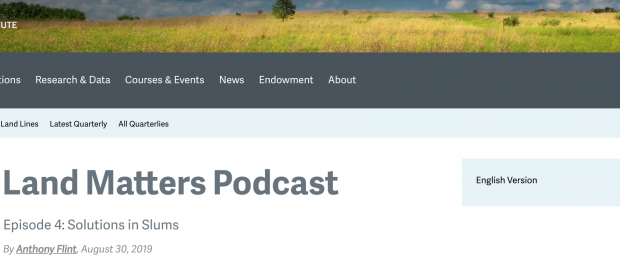Land Matters Interviews Theresa Williamson on “Slums”
From Lincoln Institute of Land Policy’s Land Matters Podcast:
Over the years, cities have responded to the expansion of informal settlements with a range of policies including eviction and relocation. But some suggest that cities should stop thinking of slums as a problem to be solved.
“Over time, they develop, and people over generations are able to transform these communities,” says Theresa Williamson, an activist for Rio’s favelas, in the latest episode of the podcast Land Matters. Williamson, founder of the organization Catalytic Communities, is in favor of testing new approaches that put more control in the hands of residents, such as community land trusts.
Joining the conversation as well is Enrique Silva, director of International and Institute-Wide Initiatives at the Lincoln Institute, who helped organize a major conference on slums last fall, Slums: New Visions for an Enduring Global Phenomenon, in collaboration with Harvard University’s Graduate School of Design and Joint Center for Housing Studies. Silva and Williamson agree that it is important not to romanticize slums, and that the most precarious conditions need to be addressed in a systematic way. But some types of informal settlement truly become vibrant communities, they say—so much so that in many places a major threat is eviction through gentrification.
The notion of working with slums in situ has been well-established, including building libraries, community centers, and water treatment plants. The construction of cable car systems to make it easier for residents to get to work has met with great success in the Colombian city of Medellín. Now, thought leaders like Silva and Williamson say, cities need to follow through in other places, building on what works, to improve existing communities while promoting alternatives to future unplanned settlement.

